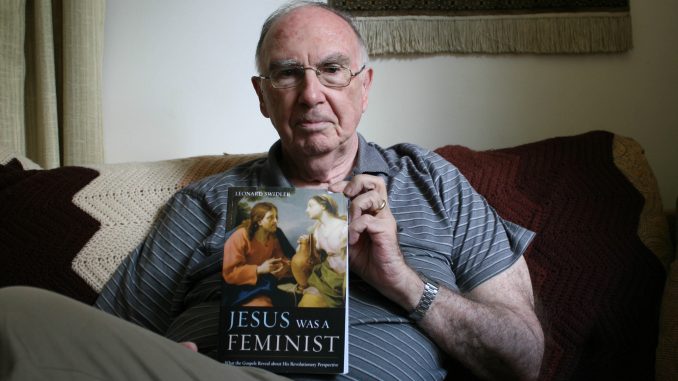
Dr. Terry Rey, an associate professor of religion at Temple, likes to think he helped in getting Pope Francis to come to Philadelphia. He was in a group video to invite the pontiff to Philly.
“Querido Papa Francisco,” meaning “Dear Pope Francis,” Rey said on film.
Now, Rey and Dr. Elizabeth Hayes Alvarez, an assistant professor of religion, will appear in the upcoming 6ABC documentary “Urban Trinity: The Story of Catholic Philadelphia” by History Making Productions. The three-part film, which is airing the week the Pope arrives, is about the history of Philadelphia’s Catholic community.
The first and second parts of the documentary will air Sept. 22 at 7 p.m., and the third part will air Sept. 27 at midnight.
Rey was originally called into History Making Productions’ studio on 12th Street near Callowhill to talk exclusively about black Catholics in Philadelphia. He wound up discussing many different subjects, however, and the filmmakers chose to include Rey in not only “Urban Trinity,” but also in their other projects; “In Penn’s Shadow” and “Franklin’s Spark.”
Alvarez got involved with the film through Kate Oxx, one of the producers of “Urban Trinity.” She met with Oxx to see if she could write a chapter for a reader Alvarez was creating for her course, “Religion in Philadelphia.” They came to an agreement that if Oxx would write the chapter, Alvarez would do something for her in return—appear on film to discuss the Bible Riots of 1844.
It was the first time Alvarez worked on a film. While she said the experience of answering a question multiple times was tiring, she was happy to contribute her knowledge.
“I think it speaks to the legacy of Philadelphia as a great, Catholic city,” Alvarez said of Pope Francis’ visit. “The Catholic community in Philadelphia has had strong institutions and a vibrant community and I think it’s honoring that legacy.”
Rey said that this visit is going to be very different from the last one in 1979 by Pope John Paul II, who he described as “progressive, but also conservative in terms of Catholic doctrine and less accepting of change than Pope Francis.”
He also noted that the Catholic church in Philly today is very different, and its decline troubles him. Rey did not think the pope’s visit would lead to a reversal of the city’s Catholic decline.
“There’s no youth, the Catholic schools are closing, Catholic cemeteries have been sold and are no longer controlled by the Archdiocese,” he said. “Incarnation of our Lord in Philadelphia was my favorite church and it closed. My wife was fond of it. I was fond of it. I was heartbroken. I don’t feel like going to Mass anymore. How can I in good conscience remain a part of it?”
Leonard Swidler, a professor of Catholic thought and interreligious dialogue, spoke to Temple Now about how Pope Francis’ visit is his way to reach the public directly.
“Francis may be using this opportunity like a presidential candidate to go over the heads of the politicians and go straight to the people.,” Swidler said to Temple Now. “He’s going to have two million people there besides everybody on TV, and if he plays it right, he could create a groundswell for public support for whatever he wishes.”
Originally, Alvarez said that she agreed with Rey. But she said her stance has changed recently, adding that Pope Francis has, in a sense, put out the welcome mat for Catholics who have felt alienated from the community and softened the Church’s image.
“Pope Francis is also particularly concerned with the poor and marginalized—he’s visiting a prison while he’s here, he’s acknowledging that cities like Philadelphia do house the poor and marginalized and he’s acknowledging the Church’s concern for those communities,” Alvarez said.
Melissa Bellerjeau can be reached at melissa.bellerjeau@temple.edu.


Be the first to comment